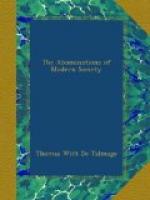Poets are fond of talking about man as an oak, and woman the vine that climbs it; but I have seen many a tree fall that not only went down itself, but took all the vines with it. I can tell you of something stronger than an oak for an ivy to climb on, and that is the throne of the great Jehovah. Single or affianced, that woman is strong who leans on God and does her best. The needle may break; the factory-band may slip; the wages may fail; but, over every good woman’s head there are spread the two great, gentle, stupendous wings of the Almighty.
Many of you will go single-handed through life, and you will have to choose between two characters. Young woman, I am sure you will turn your back upon the useless, giggling, painted nonentity which society ignominiously acknowledges to be a woman, and ask God to make you an humble, active, earnest Christian.
What will become of this godless disciple of fashion? What an insult to her sex! Her manners are an outrage upon decency. She is more thoughtful of the attitude she strikes upon the carpet than how she will look in the judgment; more worried about her freckles than her sins; more interested in her bonnet-strings than in her redemption. Her apparel is the poorest part of a Christian woman, however magnificently dressed, and no one has so much right to dress well as a Christian. Not so with the godless disciple of fashion. Take her robes, and you take everything. Death will come down on her some day, and rub the bistre off her eyelids, and the rouge off her cheeks, and with two rough, bony hands, scatter spangles and glass beads and rings and ribbons and lace and brooches and buckles and sashes and frisettes and golden clasps.
The dying actress whose life had been vicious said: “The scene closes. Draw the curtain.” Generally the tragedy comes first, and the farce afterward; but in her life it was first the farce of a useless life, and then the tragedy of a wretched eternity.
Compare the life and death of such an one with that of some Christian aunt that was once a blessing to your household. I do not know that she was ever offered the hand in marriage. She lived single, that untrammelled she might be everybody’s blessing. Whenever the sick were to be visited, or the poor to be provided with bread, she went with a blessing. She could pray, or sing “Rock of Ages,” for any sick pauper who asked her. As she got older, there were days when she was a little sharp, but for the most part Auntie was a sunbeam—just the one for Christmas-eve. She knew better than any one else how to fix things. Her every prayer, as God heard it, was full of everybody who had trouble. The brightest things in all the house dropped from her fingers. She had peculiar notions, but the grandest notion she ever had was to make you happy. She dressed well—Auntie always dressed well; but her highest adornment was that of a meek and quiet spirit, which, in the sight of God, is of




